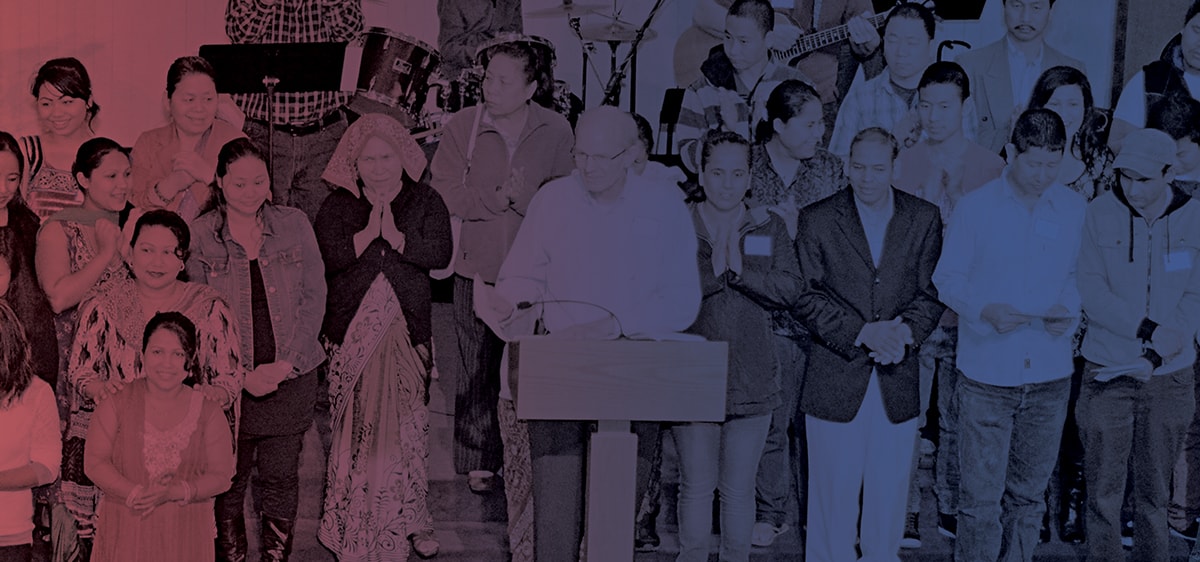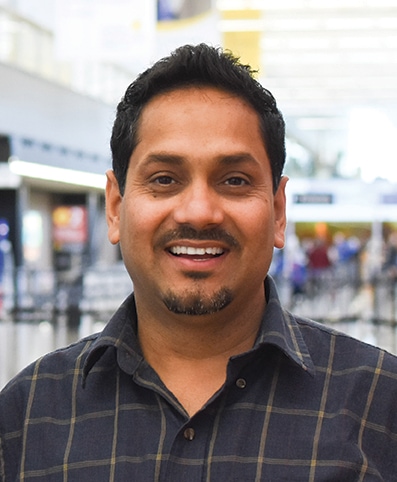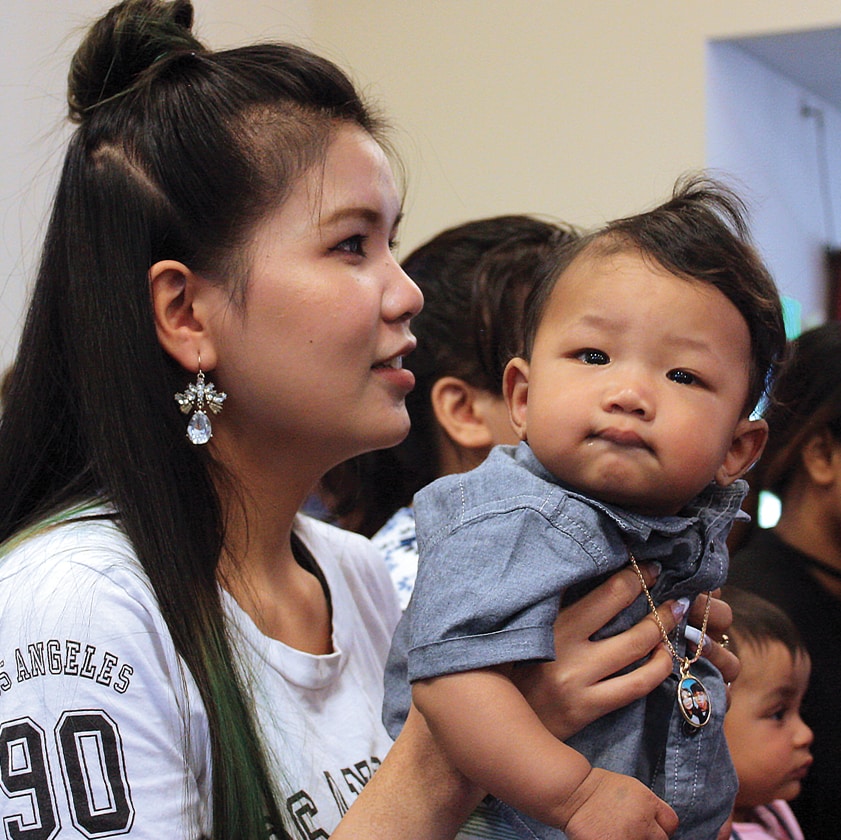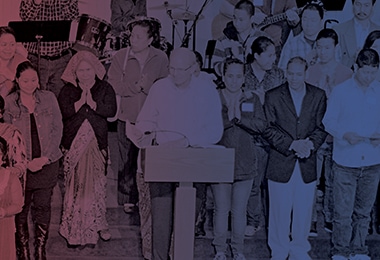[vc_row][vc_column][vc_column_text]

[/vc_column_text][/vc_column][/vc_row][vc_row el_class=”hero-header-text”][vc_column][vc_column_text]
A Nepali Surprise
How Kent Covenant Church is redefining the possibilities of world mission without leaving the country
By Jill Riley | July 17, 2017
[/vc_column_text][/vc_column][/vc_row][vc_row][vc_column][vc_column_text]
Ten years ago in the middle of a rainstorm Bashu Pasai drove up the West Coast from California toward Seattle looking for a new start. He traveled with his wife and their three-year-old daughter, leaving behind their home, work, and a community where they had begun to put down roots.
“God spoke to my heart and told me to move to Seattle,” he explains.
God’s call may have been clear, but the directions weren’t. After taking a wrong turn the family ended up in Kent, Washington, where they stayed for the night.
The next morning, they decided to stay for good.
It wasn’t Pasai’s first giant leap of faith. His journey started back in Nepal where he grew up in a fundamentalist Hindu family of eleven children. One day in college he found a Christian tract in a friend’s room with the question, “Are you happy?” In his heart Pasai knew he wasn’t.
He immediately turned his life over to Jesus, and his life changed dramatically. He found a church and began to grow in his new faith. He became an evangelist, started Bible studies, and planted three churches.
Then he made another big decision. Pasai had recently married, and he wanted a better life for his wife, Karuna, and their future family. “I saw moving to the U.S. as the answer,” he says.
They moved to central California and he found work at a grocery store/gas station while he began training to be a medical technician. He and Karuna had a baby. Pasai found a job in his field and they were building a life together.
Then, Pasai says, “God invaded my plans.” For three nights he couldn’t sleep as he wrestled with God’s call to move to Seattle. Finally he said yes. “So we packed up and drove north.”
Kent, Washington, is a city of over 125,000 located twenty miles south of Seattle. The city is growing quickly—its population has increased more than 50 percent since 2000. Much of that growth is occurring with populations of color. United States census numbers identified Kent as 70 percent white in 2000. By 2010 that number had shifted to 55 percent.
[/vc_column_text][vc_column_text]

For the past fifty years Kent Covenant Church has played an integral role in its community. When the Pasai family arrived in town, Kent Covenant was a healthy, mid-sized church that was already reaching out to its increasingly multiethnic neighbors through an English as a second language program in the church run by volunteers. They also hosted an informal, midweek “talk time,” where Ukrainian, Sudanese, and Asian community members came to practice their English skills with volunteers from the church.
“We were aware the community around us was changing and we wanted to be of help to those who were arriving,” says Keith Carpenter, pastor of Kent Covenant.
Soon after Bashu and Karuna arrived in Kent, they drove past the church and decided to attend a service there. “We immediately liked the church. They were very welcoming,” Pasai says. The family soon made Kent Covenant their church home. They settled into the life of the church and into the community. Pasai found work as an EKG technician.
About a year later, in 2008, a volunteer from World Relief contacted the church to ask if she could bring
some refugees from Nepal to a worship service. She asked if they would be welcomed. “I knew they would,” says Carpenter. “We were already becoming more ethnically diverse.”
For several weeks the volunteer packed her big station wagon as full as possible and brought refugees to church. They didn’t speak English, but they loved coming.
When the volunteer decided to return to her own church, members of Kent Covenant picked up the mantle. They used the church van and their own vehicles to bring the Nepali people to church.
Initially the Nepalese attended Kent Covenant’s Sunday morning worship service. Then after a couple months, a member of the church, Cathy Nordman, identified a specific need among their new friends. She wanted to help them develop their English skills. So she started writing lessons for a Nepali Sunday school class. Pasai translated the lessons and taught the class.
Soon the Nepali people were asking for a service in their own language so they could fully participate in worship. It took some time, but Nordman and Pasai worked together with the congregation to create a Nepali worship service. Once a month on communion everyone worships together.
Pasai served informally as their pastor and advocate, providing assistance in a variety of ways. He took them to medical appointments, helped with shopping, and filled out paperwork for jobs or for legal purposes. “We often had twenty to thirty refugees in our house. We still do! Whatever we have in the house we share. This is the way the Nepali people do church,” he says.
Pasai was spending more than thirty hours a week in his volunteer ministry, so in 2011 Kent Covenant welcomed him on staff as part-time pastor of the Nepali-speaking ministry. Two years later he became full-time.
“This gives me so much more freedom to do ministry,” he says. “Ministry is a twenty-four-hour-a-day job. Now I don’t have to go to another job to make ends meet.”
Now the Kent Covenant Nepali Fellowship worships with as many as 100 members.
Kent Covenant has helped establish other congregations as well. “We get so many requests to help other congregations and we are anxious to do so,” says Carpenter. “We place a priority on planting more ethnic Covenant churches by sharing our resources.”
By his count, they have helped seven additional congregations get started—Liberian, Central American, Mexican, Ukrainian, Samoan, and two different Bhurmese churches. Currently five congregations share space in Kent Covenant’s, building.
[/vc_column_text][/vc_column][/vc_row][vc_row][vc_column width=”1/2″][vc_column_text]
Today 100 Nepalese people have found a home at kent covenant church. Once a month they join the full congregation for joint worship on communion sundays.
[/vc_column_text][/vc_column][vc_column width=”1/2″][vc_column_text] [/vc_column_text][/vc_column][/vc_row][vc_row][vc_column][vc_column_text]
[/vc_column_text][/vc_column][/vc_row][vc_row][vc_column][vc_column_text]
Of course, blending so many traditions in one building and community can create challenges. Navigating language differences, cultural nuances, as well as complicated schedules requires care and attention. For example, Pasai says, “In Nepal we are used to longer services but the American church wants to run on a schedule.”
Carpenter adds, “We were recently all invited to a wedding, and they told us, ‘It starts at 1:30 but tell the Americans to not show up until 2:00.’ ”
Identifying the role of children in the church can also create new learning opportunities among different cultures. “We Westerners tend to feel like we need to manage our kids. The Nepali people let their children run a lot more,” says Carpenter. Also, in the U.S., children are often encouraged to receive Christ at an early age, whereas Nepali culture tends to emphasize spiritual growth in adults.
One year on Pentecost Sunday worshipers at Kent Covenant were invited to talk about their country of origin with the congregation. Individuals from twenty-one different countries stood at the microphone to share their stories. Carpenter says, “People were proud to come forward and represent their nation. For me it was representative of the melting pot Kent has become.”
In the narthex of Kent Covenant Church hang flags from twenty-six nations, each representing a country of origin of members who now call the church home. The congregation now includes people from Sudan, Ethiopia, Iraq, Liberia, Congo, Nigeria, Kenya, Uganda, Burma, India, the Philippines, and more.
Although Kent Covenant could not have anticipated the diverse community they would become, they remain committed to sharing the gospel of Jesus Christ with their ever-changing community.
And when Bashu Pasai heard God’s call to leave home, he could not have imagined the new family he would find with fellow Nepali people and Kent Covenant Church.
[/vc_column_text][/vc_column][/vc_row]














